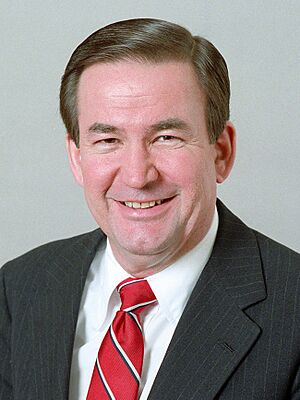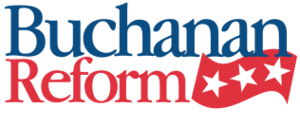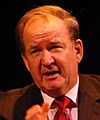Pat Buchanan facts for kids
Quick facts for kids
Pat Buchanan
|
|
|---|---|
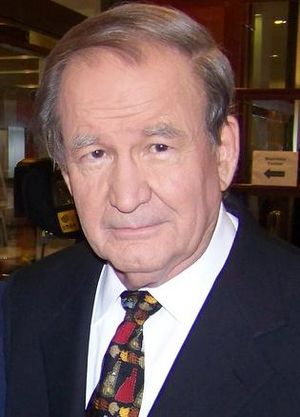
Buchanan in 2008
|
|
| White House Communications Director | |
| In office February 6, 1985 – March 1, 1987 |
|
| President | Ronald Reagan |
| Preceded by | Michael A. McManus Jr. |
| Succeeded by | Jack Koehler |
| Personal details | |
| Born |
Patrick Joseph Buchanan
November 2, 1938 Washington, D.C., U.S. |
| Political party | Republican (before 1999, 2004–present) |
| Other political affiliations |
Reform (1999–2002) Independent (2002–2004) |
| Spouse |
Shelley Ann Scarney
(m. 1971) |
| Education | Georgetown University (BA) Columbia University (MA) |
Patrick Joseph Buchanan (born November 2, 1938) is an American author, political commentator, and politician. He is known for his paleoconservative views, which is a type of conservatism that focuses on tradition and nationalism.
Buchanan worked as an advisor for three U.S. presidents: Richard Nixon, Gerald Ford, and Ronald Reagan. He later became a familiar face on television, hosting and appearing on political news shows.
He ran for president three times. In 1992 and 1996, he tried to become the Republican party's nominee. In 2000, he ran as the candidate for the Reform Party. His campaigns focused on ideas like keeping the U.S. out of foreign conflicts and protecting American jobs.
Contents
Early Life and Education
Patrick "Pat" Buchanan was born in Washington, D.C., on November 2, 1938. His father, William, was an accountant, and his mother, Catherine, was a nurse and homemaker. He grew up in a large Catholic family with six brothers and two sisters. One of his sisters, Bay Buchanan, later served as Treasurer of the United States under President Reagan.
Buchanan's family had roots in the South. His great-grandfather fought for the Confederate States Army in the American Civil War.
He attended Catholic schools and later went to Georgetown University, graduating with a degree in English in 1960. He was excused from military service due to a type of arthritis. In 1962, he earned a master's degree in journalism from Columbia University.
Early Career
Newspaper Writer
At age 23, Buchanan began working for the St. Louis Globe-Democrat newspaper. He quickly became the assistant editorial page editor. In 1964, he supported Barry Goldwater for president. Buchanan felt that the conservative movement learned and grew from Goldwater's campaign, even though he lost the election.
Working for Richard Nixon
In 1966, Buchanan became the first advisor hired for Richard Nixon's presidential campaign. He was known for writing powerful speeches that appealed to Nixon's supporters. He traveled with Nixon during his campaigns and advised him on political strategy.
During Nixon's presidency, Buchanan was a speechwriter and assistant. He helped create the term "Silent majority," which referred to the large number of Americans whose opinions were not often heard in public debates. He also traveled with Nixon on important trips, including his visit to China in 1972.
Buchanan was a special assistant to Nixon during the Watergate scandal, a major political controversy in the 1970s. He was not accused of any wrongdoing. When Nixon left office in 1974, Buchanan stayed for a short time to work for the new president, Gerald Ford.
Media Commentator and Reagan Years
Return to Media
After leaving the White House, Buchanan became a well-known political commentator. He co-hosted a radio show and appeared on TV programs like CNN's Crossfire. On Crossfire, he debated political issues with a liberal co-host, which made him a nationally recognized figure. He was also a regular panelist on the show The McLaughlin Group.
Working for Ronald Reagan
From 1985 to 1987, Buchanan served as the White House Communications Director for President Ronald Reagan. He helped shape the administration's public messages. After leaving this role, he returned to his work as a columnist and TV commentator.
Presidential Campaigns
1992 Campaign
In 1992, Buchanan challenged the current president, George H. W. Bush, for the Republican Party's presidential nomination. He disagreed with Bush's policies on taxes and foreign affairs. Although he did not win any states, he received a surprising 38% of the vote in the New Hampshire primary. This showed he had strong support from a part of the Republican party.
At the 1992 Republican National Convention, he gave a famous speech that became known as the "culture war" speech. He argued that there was a struggle for the "soul of America" between different social and religious values.
1996 Campaign
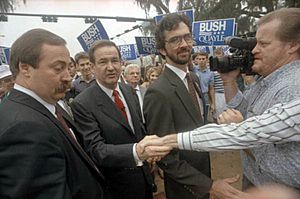
Buchanan ran for the Republican nomination again in 1996. He started strong, winning the New Hampshire primary and three other states. His campaign was seen as a challenge to the party's establishment. He told his supporters, "All the peasants are coming with pitchforks."
However, he was eventually defeated by Senator Bob Dole, who became the Republican nominee. Buchanan received about 21% of the total votes in the primaries.
2000 Campaign
In 1999, Buchanan left the Republican Party and joined the Reform Party. He became their presidential candidate for the 2000 election. His running mate was educator Ezola Foster.
His platform included:
- Pulling the U.S. out of the United Nations.
- Getting rid of several government departments, like the Department of Education.
- Ending taxes on inheritance.
- Opposing free trade to protect American manufacturing jobs.
Buchanan finished fourth in the election with about 450,000 votes. In Palm Beach County, Florida, a confusing "butterfly ballot" design caused some voters to accidentally vote for Buchanan instead of Al Gore. Buchanan himself said he could see how people made the mistake.
Later Career
After his last presidential run, Buchanan did not seek office again. He returned to writing and political commentary. In 2002, he co-founded The American Conservative magazine to promote traditional conservative ideas.
He also became a political analyst for the TV network MSNBC, appearing on shows like Buchanan & Press and Morning Joe. His time at MSNBC ended in 2012.
Buchanan supported Donald Trump in the 2016 election, as Trump's campaign shared many of the same ideas Buchanan had promoted for years.
Personal Life
Buchanan married Shelley Ann Scarney, a White House staffer, in 1971. He identifies as a traditionalist Catholic.
Images for kids
-
Buchanan greeting President George H. W. Bush in 1989
-
Gold denotes a state won by Pat Buchanan. Green denotes a state won by Steve Forbes. Purple denotes a state won by Bob Dole. Grey denotes a territory that did not hold a primary.
See also
 In Spanish: Pat Buchanan para niños
In Spanish: Pat Buchanan para niños
- Christian right
- Constitution Party (United States)
- Culture war
- Non-interventionism
- Old Right (United States)
- Paleoconservatism
- Right-wing populism
- Protectionism
- White nationalism
 | William Lucy |
 | Charles Hayes |
 | Cleveland Robinson |



